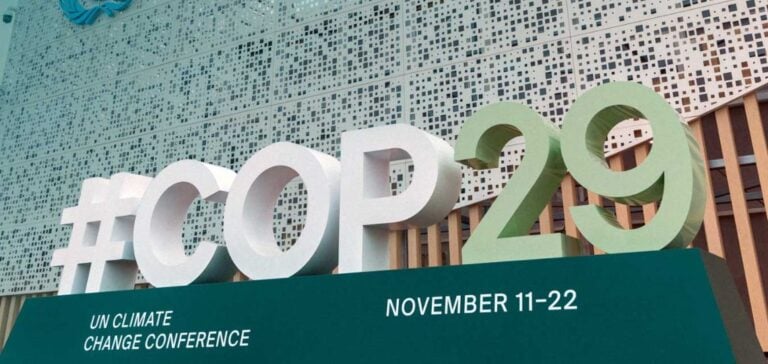The United Nations Conference on Climate Change (COP29), currently underway in Baku, marks a turning point in the regulation of carbon credits, a controversial but crucial environmental offsetting tool for several countries. Since the adoption of the Paris Agreement in 2015, this instrument has enabled states to offset their greenhouse gas (GHG) emissions through environmental projects, particularly in developing countries.
Under Article 6 of the agreement, COP29 aims to establish common rules to ensure the transparency and effectiveness of carbon credit exchanges between nations. Specifically, a country that has exceeded its GHG reduction targets can sell this surplus to another country that is less advanced in its ecological transition. Switzerland, for example, recently acquired credits from a Thai company that funds electric buses for the city of Bangkok, illustrating this mechanism.
The Stakes of Article 6
Article 6 of the Paris Agreement includes two main components: Article 6.2, which allows bilateral agreements for carbon credit transfers between countries, and Article 6.4, which creates a global market supervised by the UN for companies. However, the implementation of these provisions raises concerns about potential “greenwashing.” According to several NGOs, the system could allow companies to claim carbon neutrality simply by funding compensatory projects without reducing their own emissions.
Carbon credits rely on various projects, such as reforestation or replacing coal plants with solar facilities. The goal is to offset emissions by contributing to CO2 reduction in the atmosphere. However, studies indicate that the effectiveness of some carbon credits is often overstated, with certain projects offering only marginal GHG emission reductions.
Transactions Under Surveillance
COP29 introduces a strengthened oversight mechanism for credits exchanged between companies. Until now, the voluntary carbon market was weakly regulated, with standards mainly set by private organizations without international mandates. In response, a UN supervisory committee has been tasked with creating standards to guarantee the authenticity and traceability of credits. The newly validated credit calculation methodologies aim to ensure these exchanges comply with the climate commitments made by states.
Bilateral agreements, labeled “Article 6.2,” have already been established, allowing several countries to engage in carbon transactions even before the official rules were ratified. However, critics of these agreements argue that they could encourage some states, particularly oil-producing countries, to buy credits to offset their emissions instead of directly reducing them. Although regulated, bilateral agreements are seen as a compromise that could dilute nations’ commitment to effective emission reduction.
Diverging Opinions on the Effectiveness of Carbon Markets
The creation of these new standards marks progress in regulating carbon offsetting, but consensus on their effectiveness remains fragile. Organizations like Greenpeace argue that the carbon market represents a loophole exploited by polluting companies. They assert that these credits are used to avoid significant reductions in emissions at the source, allowing emitters to “continue to destroy the climate.”
The NGO stresses the need for direct emission reductions to limit global warming, while the carbon credit system, even if regulated, could encourage economic actors to delay their decarbonization efforts.
Towards a Global Carbon Credit Market
Despite criticism, COP29 is an important milestone toward standardizing the carbon credit market, which could make it a more transparent and credible tool for the global ecological transition. COP29’s decision to establish rules for corporate carbon credits demonstrates a desire to structure this growing market and make it more robust in the eyes of international actors.
States will now have to align their national carbon credit systems with UN standards, which could also influence companies operating in multiple regions. This development is expected to strengthen credit reliability and meet the growing expectations of investors and consumers for sustainability.






















